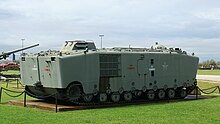LVT-5
The LVTP5 ( Landing Vehicle, Tracked Personnel Model 5, also known colloquially as Amtrac ) was an amphibious lightly armored personnel carrier of the United States Marine Corps . It was mainly used during the Vietnam War. The Philippines also used the LVTP5 at times. Production, which ran from 1951 to 1957, produced a total of 1,124 of these vehicles in a wide variety of variants.
technology
Planned as a successor to the 1951 still in the service TSLA from the Second World War , was the 5 LVT designed in contrast to the fairly open predecessors as completely closed tanks, to increase the protection for the transported soldiers.
The armor consisted of rolled steel plates that were between 1.59 cm and 0.64 cm thick. These were welded to form a watertight hull. In front was a large, hydraulically lowerable hatch that was sealed against the hull with thick rubber beads. This hatch, which reached almost the entire width of the vehicle, enabled the mounted soldiers to get in and out quickly. There was another large opening hatch over the hold. The driver's seat was in the front left next to the hatch, the commander sat on the right. Both had five M17 periscopes at their disposal. Between the two hatches for the driver and commander in a 360 ° rotatable dome was a machine-gun -type M1919 Browning machine gun with 250 rounds of ammunition mounted.
Behind the hold were the 12-cylinder Continental LV-1790-1 engine and the Allison CD-850-4 two-speed transmission. All maintenance, ventilation and exhaust openings were on the top of the tank.
Versions
- LVTP-5 (Landing Vehicle Tracked, Personnel): Troop transport, 808 units built
- LVTC-5 (Landing Vehicle, Tracked, Command): Command vehicle with additional radios
- LVTH-6 (Landing Vehicle, Tracked, Howitzer): Fire support vehicle with 105 mm gun in a rotating turret, additional anti-aircraft armament , 210 units built
- LVTR-1 (Landing Vehicle, Tracked, Recovery): armored recovery vehicle , 65 units built
- LVTE-1 (Landing Vehicle, Tracked, Engineer): Mine clearance and engineer tank, 41 units built
- LVTAA-1 (Landing Vehicle, Tracked, Anti Air): Air defense model with turret of the M42 Duster , only one prototype built
history
The Marines put the first Amtracs into service in 1956 after the older LVT models proved to be no longer up-to-date and powerful enough.
The LVT-5 was used for the first time in the Vietnam War, including during the landing at Da Nang in 1965 and in almost all major US Marine Corps operations in South Vietnam. During the missions in Vietnam it quickly became apparent that the Amtrac was inadequately protected against landmines . The Marines therefore mostly sat on top of the tank instead of in the interior, as originally intended.
The armament with a single 7.62 mm machine gun also turned out to be too weak. For this reason, LVTs were often converted into makeshift armored personnel carriers with sandbags by the marines , the M60 machine gun and the recoilless M40 cannon , but also light mortars , which were placed on the large top of the tank, were used as additional armament . Some of the tanks were also used as floating gun platforms for missions by the Mobile Riverine Force .
With the introduction of the successor LVT-7 in 1972, most were LVT-5 retired rather quickly, as they had exceeded their planned lifetime already by far and the maintenance and procurement of spare parts more difficult than proved. Around 30 tanks remained in service with reserve units until the beginning of the 1990s.
Technical specifications
| Parameter | Data |
|---|---|
| Construction year | 1951-1957 |
| Manufacturer | St. Louis Car Co., Food Machinery Corp., Ingersoll, Baldwin-Lima-Hamilton, Pacific Car and Foundry Co. |
| Length over all | 9.04 m |
| Width over everything | 3.56 m |
| height | 3.06 m |
| Combat weight | 39,820 kg |
| crew | 3 |
| loading | 34 fully equipped soldiers |
| Top speed | 48 km / h (road), 11 km / h (water) |
| Driving range | 306 km (road), 92 km (water) |
| engine | Continental LV-1790-1 petrol engine with 820 hp |
| Armament | 1 × Browning M1919 machine gun in a 360 ° rotating dome |
literature
- David Koller, LVTP5 Landing Vehicle Tracked Personnel 5 , 2016, Highgloss Publishing, ISBN 978-3-03305259-8
Web links
- LVT-5 at guntruck.com (English)
- Gallery with photos for this (English)


